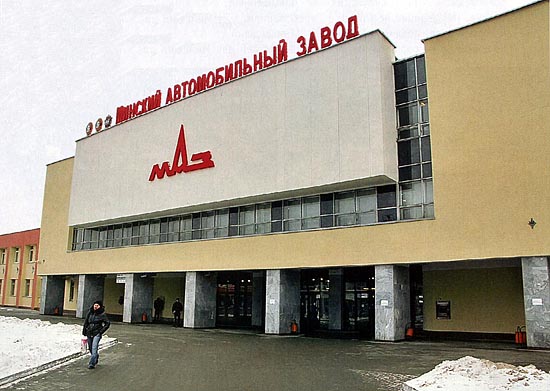
Privatizing and Nationalizing Companies in Belarus
Publication: Eurasia Daily Monitor Volume: 9 Issue: 216
By:

Under the presidency of Alyaksandr Lukashenka, Belarus’s relationship with Russia has always been one of amity combined with duplicity. In theory, Minsk’s position is that of the weaker partner, dealing with a country that can be quite ruthless in terms of using its economic clout for political ends. Today, Russian enterprises, headed by the state-owned Gazprom, appear to be making significant gains in acquiring valuable Belarusian companies. On the other hand, the Russian government, which supports this process, is some ways from attaining several valuable firms, while the Belarusian side has embarked on a campaign to renationalize companies that were privatized in the early 1990s.
Russia’s problems are epitomized in the proposed merger between the Minsk Wheel Tractor Plant (MAZ) and the Russian company KamAZ, which was designated as a joint venture. The London-based accounting company Ernst & Young was asked to evaluate MAZ and estimated its worth at $800 million. The Belarusian side immediately maintained that the assessment was too low (Kommersant, October 22). The eventual agreement was a Russian investment of $2 billion and a Belarusian one of $1.6 billion. Still, KamAZ CEO Sergei Kogogin maintained that the merger would take longer than anticipated because the issue had become politicized (Belorusskiy Partizan, November 2). The Belarusians are also concerned that because of the disparity of assets, MAZ would need to contribute 75 percent of its shares to the new company Rosbelavto—and KamAZ only 49.9 percent (tut.by, November 9).
Russia has already made significant inroads into the Belarusian banking system. Six of the leading ten banks in Belarus are owned by Russians, three others are state-owned, and only one—Priorbank—is under Raiffeisen CIS Region Holding GmbH of Austria, which holds 87 percent of the shares. In late November, Russia’s Alfa Banking Group took over Belrosbank, having failed to acquire Belinvestbank earlier (tut.by, November 11; Charter97.org, November 26). Negotiations over the sale of the joint Belarusian-Russian cell-phone company MTS have dragged on for some time, and the sale is scheduled for the end of the year. The Belarusian authorities, however, are reluctant to review its official price tag of $1 billion, despite the dearth of potential investors willing to start the bidding at such a high price. One of the biggest fears for buyers is the lack of freedom to take managerial decisions even after becoming the primary shareholder (belmarket.by, October 8–14).
In other industrial branches, Belarus is nationalizing rather than privatizing. In late October, a majority of those who took part in an extraordinary meeting of stockholders of the JSC Luch watch company protested an additional stock emission that would have increased the state’s share in the company. The state’s proposed acquisition of 25 percent of Luch stock would allow it to block decisions of the company’s supervisory board. The case is similar to those of two confectionery firms “Kamunarka” and “Spartak,” which became private in the early 1990s. On October 12, its supervisory boards were liquidated and Lukashenka demanded that the state’s share in Kamunarka be raised to 57.8 percent from the previous 27 percent; and at Spartak to 60.2 percent from 16 percent. One reason given by the president for the takeover was that key companies must be controlled by the state (belmarket.by, October 22–28; Belorusskiy Partizan, November 26). Despite the reported opposition at Luch, many Belarusians favor state control (see below).
Recently, Prime Minister Mikhail Miasnikovich acknowledged that Belarus would not meet its agreement with the Eurasian Economic Commission to privatize $2.5 billion of state assets by 2012. In theory, nationalization or reluctance to privatize enterprises are not necessarily directed against Russian intrusions. Other foreign companies could be potential investors in Belarus, a country in which the climate for business on the World Bank’s ranking is 54 places higher than that of Russia. As demonstrated by the Seventh Belarusian Investment Forum in November, however, the vast majority of foreign enterprises taking advantage of these conditions are from Russia. Twelve foreign companies from the UK, Italy, Turkey and other European states signed protocols noting their intent to begin new projects in Belarus, but most were notably cautious (The Moscow Times, November 19).
One reason for their apprehension may be the scandals and tricky maneuvers that characterize dealings with Belarus. The Russian ministry of energy has complained that this year it exported duty-free oil to Belarus with an arrangement that it be returned in the form of petroleum products. Instead, the Belarusians resold it as thinners and solvents, reneging on their previous commitments. The spokesperson for the ministry maintained that shipments of petroleum from Belarus to Russia in 2012 were about two percent of the planned total (Nasha Niva, October 11). More specifically, Belarus had agreed to export 5.8 million tons of high-quality petroleum to Russia in 2012, but had supplied only 144,300 tons by the end of August. In response, Russia is threatening to reduce its oil supplies to Belarus in 2013 from an agreed 23 million tons to only 18 million tons (Nasha Niva, November 20). The Russian reaction to its non-receipt of export duties on solvents was to demand from Belarus a sum of $1.5 billion, with the possibility that the “debt” could be repaid by providing shares in the MAZ Company (svaboda.org, November 7). Belarus has promised to deliver around three million tons of petroleum products to Russia in 2013 (belta.by, November 20), but whether Russia will give much credence to this offer is a moot point.
Finally, Belarus has evidently agreed to transfer its exports from Baltic ports to Russian ones after a meeting in Leningrad oblast between the governor, Aleksandr Drozdenko, and the Belarusian president. The concession came as a result of pressure from Russian President Vladimir Putin. Deputy Prime Minister Uladzimir Siamashka maintains that the decision was based purely on commercial considerations (belta.by, November 16). But in theory it makes little sense for Belarus, since—as noted by analyst Ryhor Astapienia—Baltic ports such as Klaipeda (Lithuania) and Ventspils (Latvia) are not only closer to Minsk than St. Petersburg, they are also warm water ports and have a cheaper and more efficient railway network and standing agreements with major exporters like the Belaruskali Company, which exports potassium fertilizers (BelarusDigest, November 16). Belarus currently is in a dilemma since it is likely to need a new Russian loan in the near future, and negotiations over oil prices with Russia are forthcoming. In the area of gas, by contrast, relations between Belarus and Gazprom are relatively harmonious following a recent meeting in Minsk between Lukashenka and chairman of the Russian company Aleksei Miller, who has promised huge investments in Belarus and to restore part of the Brest Hero Fortress historic site (belta.by, November 22).
Two conclusions can be made. First, Belarus has made many promises at the end of the year when its position is weak and failures to deliver apparent, and gradually it is succumbing to Russian avarice for its most profitable firms (the takeover of Beltranshaz being the best example, along with the currently halted bidding for Belaruskali). But second, the president recognizes that the sale of such assets is unpopular among the public—58.7 percent oppose the sale of Belaruskali under any conditions; 17.5 percent are negative but would accept the sale if the price were high, and less than 8 percent are in favor (IISEPI, September 2012 survey cited in Narodnaya Volya, October 22)—and that the sort of new nationalization demonstrated at the confectionery companies would also meet with public approval if identified with national survival and job security. Russia by now surely comprehends Lukashenka and recognizes that nothing is ever straightforward in dealings with Minsk.




